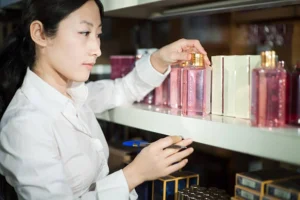Competition in the fragrance market is fierce and unforgiving. Your success or failure is inextricably linked to specific performance indicators that allow you to gauge the health and vitality of your brand.
For this reason, today we present five crucial indicators that will help you conduct a self-assessment to correct your business trajectory toward optimal performance. Before diving into the indicators, we will cover how to become a successful perfume retailer, the difference between a retailer and a fragrance company agent, and why some retailers fail despite having sufficient capital. Continue reading this article by Jasmine.
How to Become a Successful Perfume Retailer
Your success in this field depends on mastering both the commercial and production aspects simultaneously:
1. Foundational Knowledge and Market Specialization
- Study Trends: Analyze the current consumer trends and demands within your specific regional market scope.
- Evaluate Quality: Scrutinize the product, raw materials, and formulation fundamentals so you can effectively assess the quality of your purchases.
- Define Category: Determine your primary fragrance category (Ready-to-wear, Essential Oils, Private Label) to guide your marketing strategy and capital allocation.
2. Production Partnership and Consistent Supply
- Choose Your Source: Select production sources and a manufacturing partner upon whom the success of your trade fundamentally relies (Trust and Reliability).
- Seek Capacity: Look for a reliable manufacturer with substantial production capacity who offers competitive wholesale prices (such as Private Label services).
3. Visual Identity and Marketing
- Allocate Budget: Set aside a budget for building your visual identity and designing elegant, appealing packaging and boxing.
- Design for Appeal: Design packaging that suits public taste and validates the product’s quality, as visual aesthetics directly influence the purchasing decision.
4. Legal Framework and Regulatory Compliance
- Obtain Licenses: Procure all official licenses required for importing and selling all fragrance materials.
- Register Brand: Register your brand and complete the necessary governmental approvals and customs procedures related to import and distribution.
As specialists in the fragrance industry and trade, we can support you in becoming a successful perfume retailer. Do not hesitate to contact our team for free answers to all your questions.
Also read: How to Start Perfume Investment: A Full Guide to Profit

Perfume Retailer vs. Perfume Company Representative
They are fundamentally distinct in terms of their operational framework, control over market strategies, and exposure to risk:
- The Retailer (Owner): Operates as an independent brand owner, often relying on Private Label services to establish their name in the market. This model allows you complete freedom in determining supply sources, setting final selling prices, and designing custom packaging. Consequently, you bear full responsibility for inventory risks and market fluctuations.
- The Agent (Representative): This is the official representative of the parent brand. Their work focuses on sales and distribution within a specific geographical area based on the agency contract. This constrains your actions regarding the pricing and promotion policies dictated by the principal company, while the burden of inventory remains with the parent company (Principal).
Also read: Perfume Production Line: Key to Fragrance Trade Success
How do you know if a perfume Retailer Successful or not?
Here are five core indicators that differentiate the perfume trader who achieves sustainable growth from one who remains trapped in a narrow competitive circle.
1. Proactive Supply Chain Management
The successful retailer anticipates demand and doesn’t wait for inventory to run out. Instead, they establish an ongoing relationship with a manufacturer that possesses immense production power like Jasmine. This continuous partnership ensures an uninterrupted supply flow and saves you the stress of fluctuating fragrance market prices. Consequently, you can execute your marketing campaigns with confidence, unlike the retailer who suffers from stock shortages during peak seasons.
2. Specialization in Brand Building
Selling generic products does not build a strong market share. The outstanding retailer invests in establishing their own brand through Private-Label manufacturing services. This gives your product a unique identity and elegant design that elevates your brand’s overall market value. Accordingly, you must demand full control over your product name, scent profile, and packaging, rather than engaging in price competition over a common, generic item.
3. Foresight into Consumer Trends
The successful retailer constantly monitors the shifting tastes of consumers, especially in the rapidly evolving markets of the Middle East and Africa. You must track market movements to predict which scents and formulations will dominate sales in the coming years. This knowledge allows you to anticipate demand shifts and request new formulations from your manufacturer, keeping your product aligned with market needs.
4. Mastering Negotiation and Profit Margins
The unsuccessful traders often focuses on the lowest unit price, whereas the successful retailer’s priority is achieving the best possible purchase price for the highest quality. Jasmine Company offers highly competitive wholesale pricing and allows you to completely eliminate intermediaries. Direct engagement and negotiating deals on components and packaging solutions significantly boost your company’s gross profit margin.
5. Planning for Geographic Expansion
The successful retailer is not content with the local market; they look toward new territories, capitalizing on major events for regional expansion. Therefore, your growth path requires working with a partner who possesses extensive logistical expertise in export services and product transportation. Securing the arrival of your perfumes or essential oils to international agents enhances your sales scope beyond conventional borders.
Success demands a partner to support you every step of the way. Jasmine Factory is the partner that will launch you to the forefront of the competition. Just contact us, and let us work together to achieve excellence.
Also read: A Trader’s Journey with a Turkish Perfume Manufacturer

Why Do Perfume Retailers Fail When They Have Cash?
Failure often stems from ill-considered decisions in the non-financial aspects of the business. So, what are the most common pitfalls that can lead to failure?
Common Pitfalls and Mistakes
- Lack of Specialization and Knowledge: Relying on simple buying and selling without understanding the fragrance type or the purity of essential oils exposes you to purchasing substandard products that the market will reject.
- Neglecting Brand and Packaging: Overlooking the importance of building a strong, unique brand and premium packaging makes your product appear generic among competitors, making it difficult for the consumer to distinguish it.
- Relying on Intermediaries: Dealing with middlemen instead of direct international manufacturers inflates the overall purchasing cost, reduces your profit margin, and severely weakens your price competitiveness.
- Failure to Monitor the Market: Failing to keep pace with consumer trends and emerging fragrance formulations leaves your inventory obsolete and unable to meet the evolving regional taste.
- Undermining Quality: Chasing the cheapest prices without evaluating the purity of the oils or the durability of the packaging constitutes a compromise on quality. Consequently, you lose customer trust in your brand.
- Ignoring Emerging Trends: Investing heavily in traditional scents that do not align with rising consumer trends leads to inventory buildup and a slow-down in your capital turnover.
- Poor Inventory Management: Tying up your entire capital in large stock quantities without planning for sales cycles hinders your ability to quickly respond to urgent market demands and new trends.
How to Fix Mistakes Quickly to Boost Sales
- Cease Unreliable Sourcing: Stop dealing with unreliable sources immediately. Start searching for a partner that possesses a strict quality system and advanced manufacturing capabilities.
- Attend Key Events: Attend major events like the World Perfume Exhibition. This provides you with the necessary insight to understand market directions.
- Consult Product Developers: Connect with product developers to learn about trending scents. This proactive step ensures your inventory is refreshed with products that are actually in demand and meet public taste.
- Invest in Aesthetics: Allocate a portion of your capital to improving packaging design. Invest in a luxurious design worthy of your product and display it in elegant packaging that reflects its true value.
- Build Direct Partnerships: Focus on establishing direct partnerships with key distributors in regional markets, especially African markets, which can achieve rapid brand expansion beyond the local scope.
Leverage Jasmine’s production power and extensive network to formulate your perfumes and design your packaging to the highest quality standards. Contact our expert team, and become our partner in success.
Also read: Color Psychology in Packaging: How to choose Selling Colors

Jasmine’s Tips for Becoming a Successful Perfume Retailer
To establish yourself as a leading perfume retailer, focus on these critical areas:
- Build a Private Label Brand: Focus on building a private label brand with a unique identity that elevates your commercial value and facilitates distinction in the market.
- Negotiate Direct Deals: Conclude direct wholesale purchasing agreements with primary manufacturers to eliminate intermediaries and achieve competitive pricing.
- Invest in Aesthetics: Invest in elegant packaging and innovative bottle design that enhances product appeal and confirms its purity.
- Plan for Expansion: Strategically plan for export operations and expansion into regional markets through a reliable network of key distributors.
- Analyze Trends: Constantly analyze trends in essential and fragrance oils to continuously refresh and update your formulations.
- Request Samples: Always request factory samples of bulk quantities before finalizing any contract. This allows you to physically verify the quality of the production batches.
- Attend Key Events: Participate regularly in the World Perfume Exhibition and other international forums. This deepens your industry knowledge and opens new sourcing channels.
- Ensure Legal Compliance: Employ legal consultants in export operations to ensure customs procedures are handled with high efficiency and efficacy.
- Develop Digital Presence: Focus on your brand’s digital infrastructure, as a strong system enhances your reach to a wider segment of key distributors and retailers.
Also read: Perfume Inventory Management: Avoid Stockouts During Peak Seasons
Jasmine: One of the Best Perfume Manufacturers with +70 Agents Worldwide
Jasmine stands as one of the strongest production platforms for fragrances in Turkey, boasting a wide international reach through a network of over 70 agents globally. Our specialization lies in providing Private-Label services, enabling you to build your brand with superior quality and innovative packaging designs.
We focus on achieving the balance between the purity of essential oils and competitive pricing, thereby boosting your profit margin in international markets. Seize these production capabilities to secure exclusive, elegant products that attract distributors and affirm your leading market position.
Read also: White-Label Perfume Manufacturer (Complete Guide)
How We Help to Start a Perfume Retail Business?
- We offer complete Private-Label manufacturing with elegant packaging that enhances your competitiveness.
- We guarantee you the best wholesale supply prices, which clearly improves your profit margin.
- We provide pure essential and fragrance oils to ensure the highest quality for your final products.
- We support your export capabilities through our wide network, which includes over 70 global agents.
- We equip you with the logistical and production solutions that enable you to compete effectively in international markets.
To achieve distinction, you need the production power to secure a private brand with elegant packaging and competitive wholesale pricing. Join our global family, and let’s begin the first steps of establishing your business on a global foundation